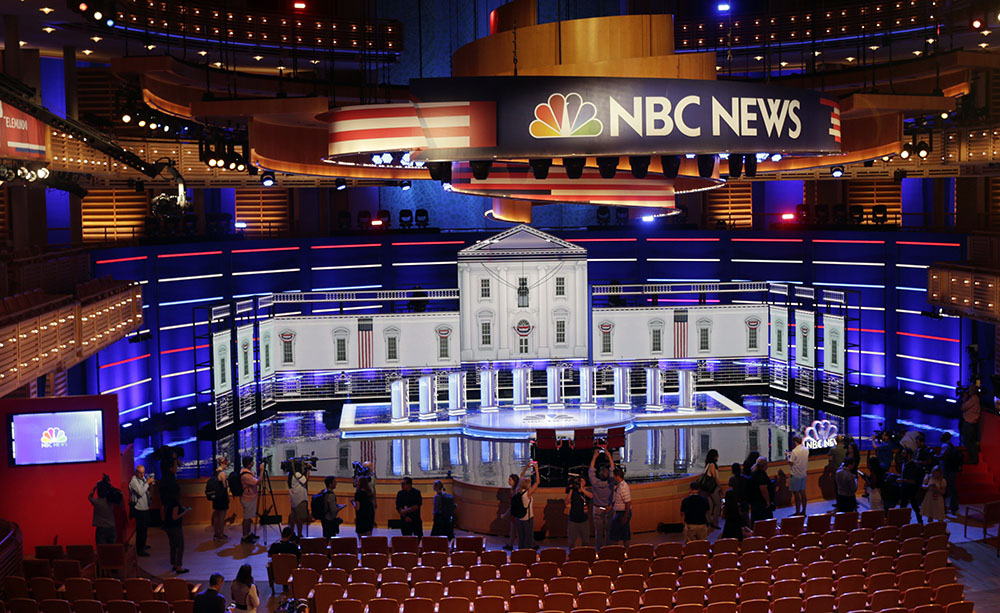
(RNS) — What has gone from couldn’t, to wouldn’t, to can and now, perhaps, to shouldn’t?
The answer is setting the religious world on fire. Last week, the Internal Revenue Service decided to essentially set aside its long-standing prohibition of religious leaders and institutions endorsing or opposing political candidates.
The so-called Johnson Amendment was a provision in the United States tax code that prohibited 501(c)(3) nonprofit organizations, including churches, from “participating in, or intervening in, any political campaign on behalf of (or in opposition to) any candidate for public office.” It first passed in 1954, after having been proposed by then-Sen. Lyndon B. Johnson.
In response to the policy change, Rabbi Jonah Dov Pesner, director of the Religious Action Center of Reform Judaism, said in a statement his organization was “deeply alarmed.”
“Permitting synagogues and other houses of worship to endorse or oppose candidates undercuts the integrity and unity of these religious institutions, turning them into an extension of political candidates or parties,” he wrote. “Because of the hyper-partisan quality of contemporary politics, this risks dividing congregations and alienating those supporting different parties or candidates, thereby threatening the congregation’s status as a place where all feel welcome, rooted in faith teachings and transcending partisanship.”
But religious institutions have never been politics-free spaces. They have always been allowed to sponsor non-partisan efforts, such as voter registration drives, public forums and debates, and to advocate on issues. The key was, those activities could not be tied to specific candidates.
Many people say religious institutions should be devoid of any political activity because they believe in the separation of church and state. The original intention behind that sacred idea was to protect religion from government interference — and vice versa. Every history student knows one of the longest words in the English language: antidisestablishmentarianism, or the belief that there should be an establishment of religion in a state. I would lengthen that word even more and say I am an anti-antidisestablishmentarian.
However, the separation of church and state does not mean there should be a separation of church and society. Faith has always inserted itself into the American public square — sometimes malevolently, but often for good.
I am writing from Jerusalem, where the role of public religion would require several long essays. I just strolled down Martin Luther King Street in my favorite neighborhood in this holy city. The Rev. Martin Luther King Jr. helped craft the American Civil Rights Movement out of his religious vision, which might have been far more indebted to the Exodus story than to the Gospels. The same is true of Rabbi Abraham Joshua Heschel, who famously said that when he marched for civil rights in Selma, Alabama, he felt he was “praying with his legs.”
Several years ago, some of my congregants did not like that I preached about political issues, saying, “No politics from the pulpit!” That actually translates to, “I disagree with what you said.”
I pointed out the root of the word “politics” came from the Greek word “polis,” which means “public space.” I responded that what happens in the public spaces of America is quite rightly the dominion of the pulpit, and it always has been, going back to the biblical prophets. “If you want,” I said, “I can give sermons on why we say the blessing over the wine before we say the blessing over the bread.” Many then agreed they would rather hear sermons relevant to their lives and to the life of America and the world. And they realized those sermons would not always make them comfortable.
The role of religion is to comfort the afflicted and to afflict the comfortable — or, as the title of this column refers to, to shake us and stir us. What happens in the public realm is not only fair game, but it might be the main game.
How does a preacher do that? I call it the three Ps: clergy can and should speak about philosophy, principles and programs. You avoid speaking about parties and personalities during a political campaign.
But, once a candidate becomes an office holder, it is fair to name names.
My shelves are filled with books of sermons given by past and present luminaries that reflect on topics like the Vietnam War, civil rights, Watergate and other political issues. When preaching becomes protest, the preacher should give their people something concrete to do, lest their words stay mere words.
Right now in our country, we are afflicted, and we need comfort. I fear far too many people are far too comfortable with what is going on in America: the crumbling of our democratic values, the rise of authoritarianism (some might even say neo-fascism) and the weaponization of cruelty. We need vigorous religious responses that channel the model of Dietrich Bonhoeffer, the German Lutheran pastor, theologian and anti-Nazi dissident who resisted Hitler’s regime and suffered martyrdom for doing so.
I dare say none of my colleagues will suffer martyrdom for speaking their truth and asking their people to act on it.
Most of my colleagues will ignore the new IRS ruling. They will refuse to endorse or condemn political candidates or to have candidates appear, for example, during the High Holy Days.
They won’t have to endorse candidates, because if they’ve been preaching their values for any length of time, their congregants already know who they would endorse.
Which is fine. That’s called religion.
